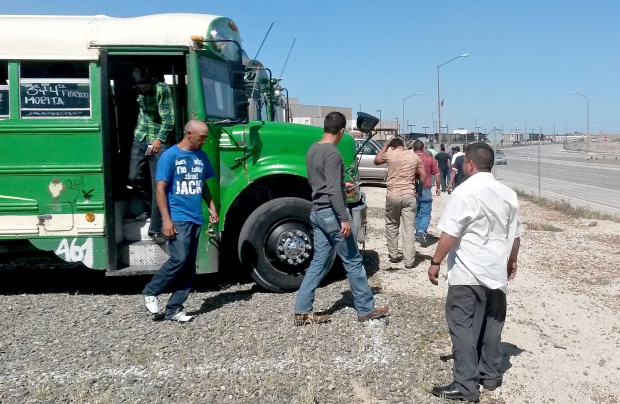
H-2A workers arrive at the U.S. Consulate in Tijuana, Mexico, for interviews on May 13, 2014. Each worker undergoes a background check and a personal appointment says Washington Farm Labor Association staff. (Courtesy Heri Chapula/Washington Farm Labor Association)
Potential H-2A workers—mostly seasonal apple pickers who should be headed toward Washington and Oregon in August—are being held up or turned away at the Mexican border by “snafus” in the visa issuing system at the U.S. Consulate in Tijuana, Mexico.
The Washington Farm Labor Association (WAFLA) told its member growers that it has canceled appointments for workers seeking farm work visas at the consulate because the State Department can’t produce the visas.
Dan Fazio, director of WAFLA, said his organization recruits about 80 percent of the H-2A workers that come to the Pacific Northwest. The early season workers—the largest proportion of about 8,000 H-2A workers that come to Washington State—came in without incident, but those who would come for late summer and fall work are not getting their visas.
“The usually smooth two-day visa process declined in efficiency starting on July 8 and has been at a complete stand-still since July 21,” Fazio said in a press release July 30. “As of today, a group of farm workers has been stranded at the border for nine days. They have run out of money and are relying on funds being wired by their prospective employer.”
In early July, the U.S. Consulate staff in Tijuana indicated the delays were caused by the humanitarian crisis related to unaccompanied children from Central America, Fazio said. Later the State Department issued a statement blaming the delays on a technical glitch in getting printed forms, which it promised would be resolved soon.
A spokeswoman from the State Department told the Yakima Herald-Republic that the computer system that prints visas crashed on July 19 and only partially returned July 23.
“It crashed and it’s not a small deal, it’s a pretty big deal,” said Nicole Thompson, a Washington, D.C., spokeswoman for the State Department.
“This is truly a crisis,” Fazio said. “The workers are stuck at the border with no money, and the farmers have no workers. This is not any way to treat employers who are paying thousands of dollars per worker, or workers who are trying to do the right thing.”
He estimated that up to 2,000 potential workers have been stymied at the Tijuana crossing and another 800, who would head toward the Southeast, are stranded at Nuevo Laredo. “We need to fix this system before the big crossing in August,” he said.
WAFLA is working with Washington State Senator Patty Murray and Representative Denny Heck, seeking their help to resolve the problem, and has written to the State Department.
“Farmers in Washington State pay more than $1,000 per worker to use this legal worker program,” Fazio said. “Included in this amount is a payment of $190 fee for each worker visa appointment. The H-2A visa is unique because it requires the prospective employer to pay worker transportation and subsistence fees from the time the worker leaves home, even before the worker receives a visa.”
WAFLA is asking Congress to immediately authorize a payment from the U.S. Consulate directly to the worker of $150 for each day that a worker is asked to wait, and compensation for farmers’ losses at $500 per worker per day. “Congress should also grant funds to process the legal visa-seekers who are stranded at the borders,” Fazio said.
“Workers are suffering and crops are going to rot in the field,” he said.
Learn more about the H-2A program from our May 1 story “Growers make H-2A work”.






Leave A Comment